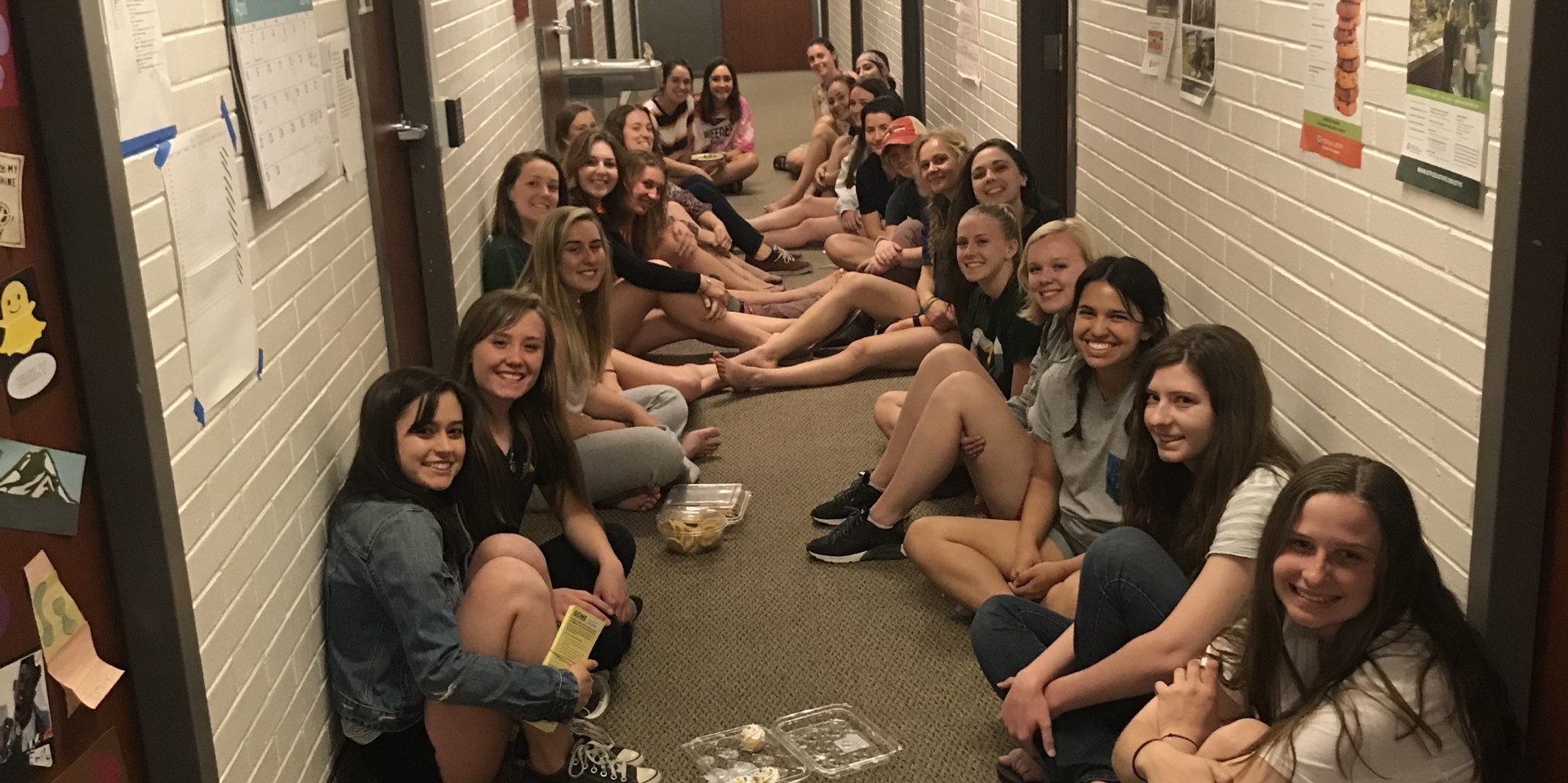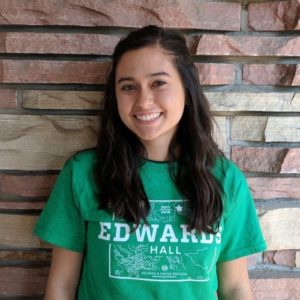
Residents of Edwards Hall on Resident Assistant Emily Hortareas’ floor. Photo courtesy Emily Hortareas
Why would anyone want a job where you are on call nearly 24/7, looking after other people, while trying to achieve your own educational goals?
Colorado State University senior Emily Hortareas says she loves every minute of her time as a Resident Assistant. This will be her third year as an RA, living and working on an all-female floor in Edwards Hall; she has also worked in Academic Village, and has never lived off campus during the academic year.
“I think what really inspired me to become an RA was moving a lot growing up,” she says. “I was a ‘military brat’, so I am kind of an expert at transition. I wanted to be able to help incoming students transition to CSU.”
Building community among her residents, as well as being able to assist students who are new to campus — helping to ease the transition from home life to university life — is what keeps Emily interested in what she does.
An RA’s job is to create a community that is conducive to learning and growing. There are some things they do to ensure safety in the halls, but RAs are also there as a live-in support system. If students are struggling with a class, their RA can connect them with tutoring resources. If they are having personal or roommate issues, their RA can help resolve the problem or find the right people on campus who can help.
“I am a person my residents can count on, which is an honor,” Emily says. “I had one resident call me during winter break last year because she was going through a family crisis and needed someone to help her through it. Though I technically wasn’t ‘working’ or ‘on duty,’ I was privileged to be the person that resident thought to call.”
What it takes to become an RA at CSU
To apply to become a Resident Assistant at CSU, students need to meet the following requirements:
- live in the residence halls (at CSU or elsewhere) for two full semesters by the time they begin working as an RA
- be currently enrolled at CSU and making progress toward a degree
- be in good academic standing with the University; a GPA of 2.5 is preferred
- complete at least 15 credit hours
- complete required training
Find more information on the Housing website.
Work/life balance

Emily is an environmental health major with a mathematics minor in her final year at CSU and in the throes of applying to medical schools. She has been able to juggle a tough academic schedule with the challenges of a job that encompasses her days, nights, and weekends by keeping life in perspective.
“Living where you work is definitely a challenge,” she admits. “Finding time for yourself when you have to be available to others is hard to manage. It can be hard to prioritize yourself when you have to prioritize others and your presence on the floor.”
Emily takes time for herself through running, which not only keeps her in shape, but also gives her a mental break while providing time to be off-campus.
So what is it that attracts students to take on a job that often swallows up their time and energy?
According to Hannah Elliott, CSU graduate assistant for training and development, there are many reasons students choose to be RAs. It could be that they had a great RA their first year living on campus and want to provide that same experience to others. Or perhaps they had a negative experience with their first RA and want to have a better impact on others. For others it is often the initial draw of free room and board, and then they come to realize the intrinsic benefits. Perhaps they were involved with leadership programs and saw becoming an RA as a next step. Or they simply realize that it is a great skill-building opportunity.
Extensive training
Whatever brings first- and second-year students to consider becoming Resident Assistants, they rarely arrive with previous RA experience. CSU has a fairly extensive recruitment and training process that prepares student staff with the skills necessary for this complex job.
According to Elliot, the skills RAs acquire include:
- Relationship building
- Crisis intervention/response/management
- Eye for detail/creativity
- Knowledge of campus and community resources
- Better sense of and understanding of oneself
- Importance of identities
- Intentional and casual conversations
- Establishing oneself as an authority figure among peers
- Paraprofessional counseling
- Conflict mediation
- Leadership
- Navigating life
Emily has learned priceless life skills through her RA role.
“Like many students, I came to college feeling insecure and trying to find myself. Being an RA has taught me confidence and patience,” she says. “This role has also taught me that I can be grounded and confident in my values while appreciating and understanding diverse values, experiences, and cultures. I have also learned a lot of customer service skills through my position.”
But the bottom line is that you really have to enjoy what you do. For Emily, it’s simple.
“I have consistently come back to being an RA because I love the family it creates. It reminds me of being a young girl and my love of sleepovers — being an RA is like having a perpetual sleepover!”
You get to do it again, and again, and again.
Related Story: Record year for students living on campus at Colorado State University